|
September 28, 2017
The Assault on Stelco Workers' Rights
Taking Environmental Remediation
Off the Balance Sheet
- K.C. Adams -
PDF
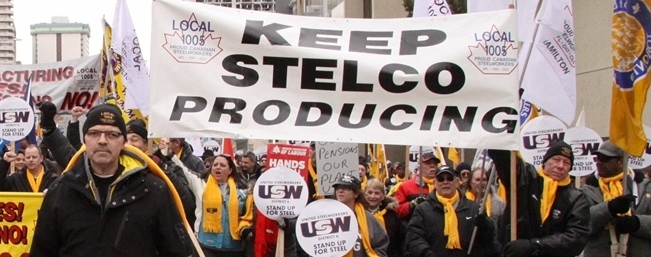
The
Assault
on
Stelco
Workers'
Rights
• Taking Environmental Remediation Off the
Balance Sheet - K.C. Adams
Public Sector Workers
Protest Nova Scotia Bill 148
• Workers Demand the Right to Determine Their
Living and Working Conditions
• We Must Be the Decision-Makers! -
Kevin Corkill, Nova Scotia Public Service Worker
Parliamentary Hearings
on Changes to Transportation Act
• The Real Aim of Bill C-49 -
Pierre Chénier
The Assault on Stelco Workers' Rights
Taking Environmental Remediation
Off the Balance Sheet
- K.C. Adams -
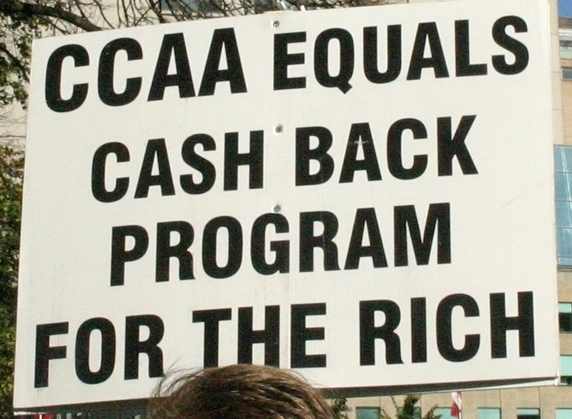 The
Bedrock deal seizing
control of Stelco from U.S. Steel and exiting from bankruptcy
protection of the Companies'
Creditors Arrangement Act (CCAA) officially took environmental
remediation of Stelco's
historical industrial lands off the balance sheet. In truth however
environmental remediation
has never been on Stelco's balance or on the balance sheet of any big
corporation for that
matter. Otherwise, the problems of industrial pollution of the Stelco
lands and Randle reef in
Hamilton Bay or the broader challenges of climate change would already
have been
addressed. Taking something off the balance sheet means the issue, such
as defined-benefit pensions or environmental remediation, no longer has
a claim on the value workers produce at the particular company. The
Bedrock deal seizing
control of Stelco from U.S. Steel and exiting from bankruptcy
protection of the Companies'
Creditors Arrangement Act (CCAA) officially took environmental
remediation of Stelco's
historical industrial lands off the balance sheet. In truth however
environmental remediation
has never been on Stelco's balance or on the balance sheet of any big
corporation for that
matter. Otherwise, the problems of industrial pollution of the Stelco
lands and Randle reef in
Hamilton Bay or the broader challenges of climate change would already
have been
addressed. Taking something off the balance sheet means the issue, such
as defined-benefit pensions or environmental remediation, no longer has
a claim on the value workers produce at the particular company.
Environmental remediation should be on the balance
sheets of all
companies as a matter of
course similar to constant maintenance of industrial machinery,
buildings and transportation
routes. This will not happen at Stelco or anywhere without a huge fight
led by the working
class because such a pro-social humanized direction comes into direct
conflict with the aim of
the imperialist economy for maximum private money profit.
Bedrock, Essar Steel Algoma, and retail outlets such as Sears and Toys
'R' Us will not agree
to have anything on their balance sheets that interferes with their aim
of maximum money
profit, such as defined-benefit pensions, other post-employment
benefits (OPEBs) or constant
environmental remediation. Anything on a balance sheet that interferes
with or reduces money
profit comes into direct conflict with the aim of those who own and
control the enterprise. To
serve their narrow aim, the imperialists use the CCAA and Chapter 11 in
the U.S. as weapons
of legalized theft of what belongs to workers by right and to avoid
taking up social
responsibility for the social and natural environment.
 The Bedrock CCAA deal
contains a spectacle of not only taking environmental remediation off
the balance sheet officially, so as to avoid any possible future
lawsuits, but also a charade to cover the theft of what belongs to
Stelco pensioners by right through reneging on longstanding promises
regarding the continued funding of defined-benefit pensions and OPEBs.
The deal concocts
a "Land Vehicle to
hold USSC's (Stelco's) real property and certain assets that will not
be leased by USSC
(Bedrock aka Stelco) that are not used in steelmaking."[1] The Land Vehicle is charged with
cleaning up the
Stelco lands not used in steelmaking and then selling the lands. The
sale of the lands is then
supposed to finance the existing pension benefits and OPEBs, which are
likewise no longer on
the balance sheet and financed from company earnings. All new employees
are completely
denied defined-benefit pensions and OPEBs. The Bedrock CCAA deal
contains a spectacle of not only taking environmental remediation off
the balance sheet officially, so as to avoid any possible future
lawsuits, but also a charade to cover the theft of what belongs to
Stelco pensioners by right through reneging on longstanding promises
regarding the continued funding of defined-benefit pensions and OPEBs.
The deal concocts
a "Land Vehicle to
hold USSC's (Stelco's) real property and certain assets that will not
be leased by USSC
(Bedrock aka Stelco) that are not used in steelmaking."[1] The Land Vehicle is charged with
cleaning up the
Stelco lands not used in steelmaking and then selling the lands. The
sale of the lands is then
supposed to finance the existing pension benefits and OPEBs, which are
likewise no longer on
the balance sheet and financed from company earnings. All new employees
are completely
denied defined-benefit pensions and OPEBs.
The Court also created an "Interim Land Restructuring
Officer (LRO) to
provide interim
temporary governance and administration of the special purpose entity
(the 'Land Vehicle'),"
who is none other than the CCAA Monitor Ernst & Young. The U.S.
accounting parasite
E&Y has already seized tens of millions of dollars in CCAA fees
from Stelco since 2014 and
undoubtedly will claim millions more as the LRO and in other ways.
The CCAA settlement handing Stelco to the U.S.
investment company
Bedrock declared the
new owner and all previous owners not liable for the environmental
remediation of the steel
company's historical land, the defined-benefit pensions or the OPEBs.
The LRO has presented
a budget for the Land Vehicle, which already includes a draw of $1.5
million from a line of
credit from the Ontario provincial government. This loan of course will
have to be repaid
with the sale of the remediated lands. How much will be left for
pensions and OPEBs is
speculation but the LRO has already been busy spending the provincial
loan.[2]
The Land Vehicle Budget shows Total Disbursements for
the Stelco Legacy
Lands "Land
Vehicle" at $1,674,938 and Net Outflow at $1,351,890. The disbursements
include
Professional and Consulting Fees, mostly going to E&Y, and one to
dispose of piles of Red
Oxide listed at $52,577. The note for this reads, "7. As discussed in
note 3, (There are red
oxide piles on the non-leased Land Vehicle lands that need to be
removed.) These are the
monthly expenses to dispose of the red oxide piles.... These piles are
part of the secondary
materials on the legacy lands that need to be addressed."
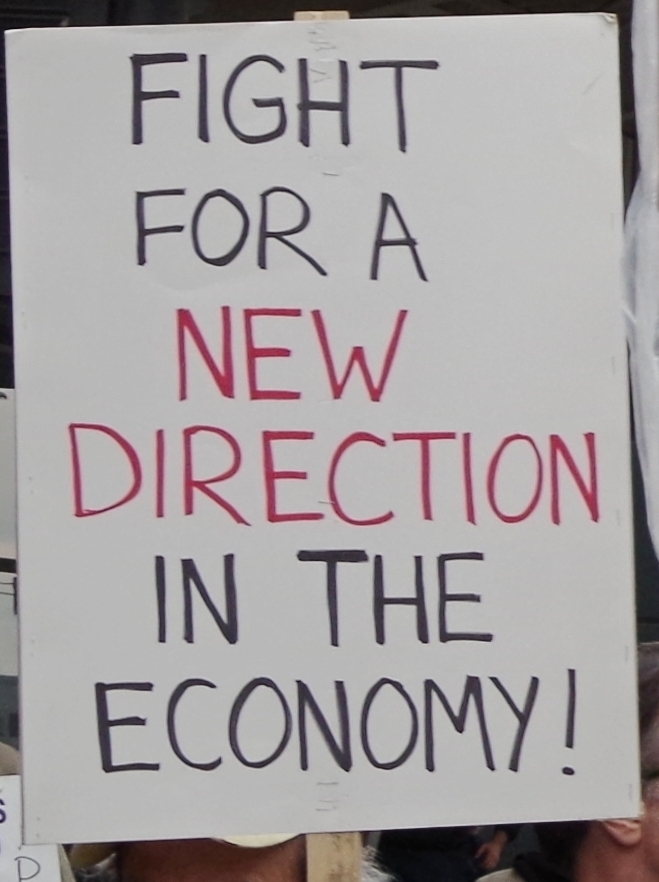 The secondary materials and
any unused structures have to be removed
before dealing with
the polluted soil. The Land Vehicle also has to pay property taxes
until the lands are sold. For
2017, the Land Vehicle will pay $188,801 and apparently is on the hook
to pay back Stelco
$1.5 million in municipal taxes already paid.[3] The secondary materials and
any unused structures have to be removed
before dealing with
the polluted soil. The Land Vehicle also has to pay property taxes
until the lands are sold. For
2017, the Land Vehicle will pay $188,801 and apparently is on the hook
to pay back Stelco
$1.5 million in municipal taxes already paid.[3]
These self-serving manoeuvres of the financial oligarchy
do not solve
any fundamental
problems in the economy. They appear increasingly as desperate attempts
to defend class
privilege and the outmoded economic aim of fighting for maximum private
money profit. The
modern economy on which the people and society depend for their
survival needs cooperation
amongst all its sectors in conformity with its socialized nature not
the incessant infighting of
the competing empire-builders and theft of what belongs to workers by
right.
The increasing use of the CCAA is proof that the modern
socialized
economy cannot solve its
problems with the old direction and aim. A new pro-social direction and
aim for the economy
are required to humanize the social and natural environment and
guarantee the well-being of
the people and general interests of society.
Note
1.
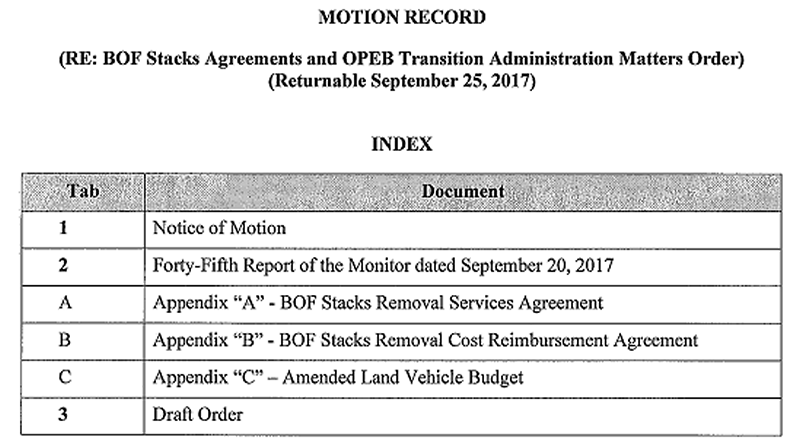
For the complete Motion Record of the Monitor --
Returnable Sept 25,
2017 click
here.
2. For Appendix C of the September 25 Stelco CCAA motion
record "Amended Land Vehicle Budget" click
here.
3. See item 5 in Appendix
C
of
the
September
25 Stelco CCAA motion record.

Public Sector Workers Protest Nova Scotia
Bill 148
Workers Demand the Right to Determine
Their Living and Working Conditions
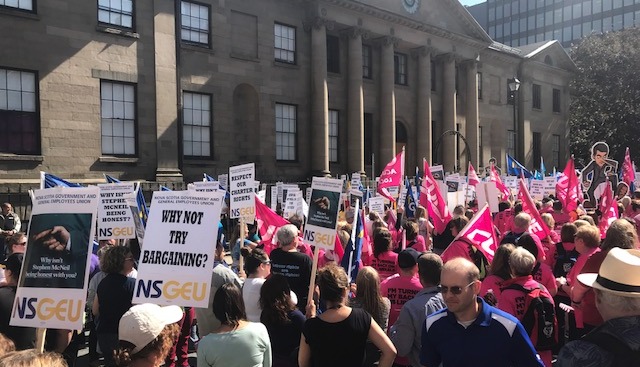
On September 21, public sector workers from across
Nova Scotia gathered in Halifax at the opening of the Fall Session of
the
Legislature to voice their opposition to Bill 148, the Public
Services Sustainability (2015) Act. Enacted by the McNeil Liberals
on August 22, it imposes wage restrictions and removes
longstanding articles from existing collective agreements.
Representatives from unions representing
over 75,000 Nova Scotia public sector workers gathered at the
Legislature shouting, "McNeil has got to go!" and "Whose House? Our
House!" and enthusiastically welcomed more and more workers as buses
arrived from around the province.
Workers from the Nova Scotia Government and General
Employees Union, the Nova Scotia Nurses' Union, the Canadian Union of
Public Employees (CUPE) and the Nova Scotia Teachers Union as well as
students were joined by presidents from three national unions,
representing hundreds of thousands of workers across Canada, who
addressed the roaring crowd.
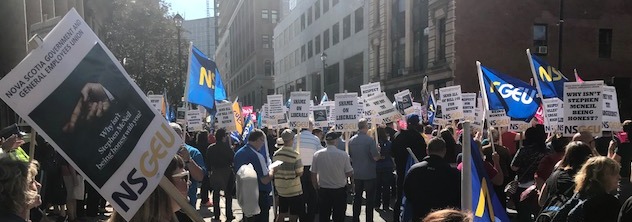
Larry Brown, National President of the National Union
of Public and General Employees highlighted the workers' conviction and
ongoing defence of their rights and called on Premier McNeil to "Stop
this ill-informed fight on workers' rights because we will prevail!" He
denounced the government's use of police powers to impose wage
restrictions and other measures, saying, "The term for someone who
negates people's rights is a dictator."
Mark Hancock, National President of CUPE, expressed the
spirit of workers across Canada to fight for their rights, warning
governments and employers, "Don't screw around with us, we will take
you on. In the courts, at the bargaining table and in the streets!" He
also stressed the need for the working class across Canada to stand
together to defend rights, saying "You take on one of us, you take on
all of us."
Jerry Dias, National President of Unifor, denounced
Premier McNeil's attacks on public sector workers and the rights of
Nova Scotians saying, "Who goes after teachers and nurses? Stephen
McNeil does!" to which the crowed shouted "Shame!"
Alex Furlong, Director of Atlantic Region of the CLC
said, "This is a message to Premier McNeil, we will be here long after
you are gone... let this be a message to the Premier, this is our
House!"

The highlight of the action was the throng of workers
encircling the Legislature as it reopened, who carried the day with
their invigorating and militant spirit. Their chants of "Whose House?
Our House!" drowned out the bagpipes welcoming the Lieutenant Governor
and MLAs. It was a bold affirmation of their right to decide and for
wages
and working conditions commensurate with the work they do, and firmly
conveyed their opposition to the McNeil government's attempt to dictate
the working and living conditions of Nova Scotia public sector workers.

We Must Be the Decision-Makers!
- Kevin Corkill, Nova Scotia Public
Service Worker -

Halifax, September 21, 2017.
On August 22, Liberal Premier of Nova Scotia
Stephen McNeil enacted Bill 148, the Public Services
Sustainability (2015) Act. Much like Bill 75, the
Teachers' Professional Agreement and Classroom Improvements (2017) Act
imposed on Nova Scotia teachers in February, this is the McNeil
government
using police powers masquerading as legislation.
McNeil, attempting to rationalize the Liberal
government's decision declared, "I've made it very clear that an
unelected, unaccountable arbitrator will not determine the taxpayers'
ability to pay." It is within this narrative that the McNeil government
wishes to impose its thinking and dictate on the people of Nova Scotia
and public sector
workers using the anti-social fraud of "taxpayers' ability to pay."
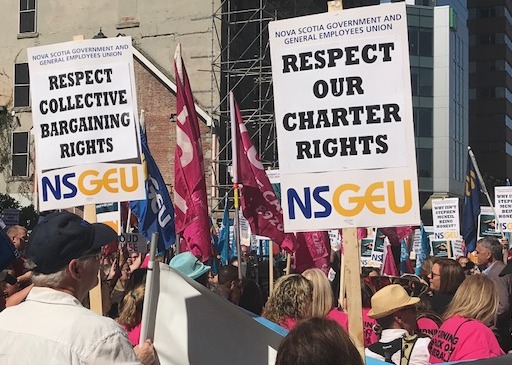 It is a tired and misguided
argument that attempts to split the people of Nova Scotia into
"taxpayers" versus those who work to provide public services for the
people of Nova Scotia. It is to fool the gullible, divide the people
and hide the fact that this is not a solution to any problem. It is a tired and misguided
argument that attempts to split the people of Nova Scotia into
"taxpayers" versus those who work to provide public services for the
people of Nova Scotia. It is to fool the gullible, divide the people
and hide the fact that this is not a solution to any problem.
In today's neo-liberal world dominated by the
anti-social fraud of individual taxation and user fees, the rendering
of people as "taxpayers" is a ploy to deny that our province is made up
of the people that live in, contribute to and depend on it for their
well-being.
The level of services, provided by those in all public
sector jobs, is precisely what guarantees the stability, peace of mind
and necessities for the people of Nova Scotia.
The social wealth produced in the economy by workers in
the public sector finds its way into many different forms. There are
the
years of education from primary to grade 12 that produce capable
and knowledgeable workers. There are the years of health care that
help build the capacity to work of every Nova Scotian, who inevitably
use this social program starting from birth. There are countless
services that allow safe, standardized and professional work to be
carried out everyday in Nova Scotia to which every teacher, health care
professional and other public sector worker has contributed.
Even though public sector workers are the largest
workforce in Nova Scotia, produce most of the social wealth claimed by
the province and are essential to the socialized economy, the McNeil
government continues to disrespect us as a matter of course.
What is the role and responsibility of government? What
problem is McNeil sorting out? The common anti-social refrain "living
within our means" again only poses the question in such a way that
highlights that the actual producers of wealth in Nova Scotia do not
control the social wealth nor its production.
A true modern democracy acts to uphold the aim of
building our province and the defence of the rights of workers and
their communities, including the decisive control of the direction of
public services and what working conditions are necessary to work in
dignity and security including in retirement.
The premise that public sector workers or social
programs are a "cost" is an attempt by those in power to put
arrangements in place to remove those that produce all the material and
social infrastructure from decision-making and to keep the needs of the
people from being put in first place.

Halifax, September 21, 2017.
Furthermore, the "taxpayers" McNeil speaks of is a
category that serves to deny that the people of Nova Scotia are
citizens and residents with rights. It also presents them as a faceless
mass of powerless consumers who are victims of public sector workers'
fight to defend our rights.
What other role should a government play other than to
try to meet the needs of its people and put them in first place? Is
McNeil trying to say that for Nova Scotia to live "within its means"
means that over 37,000 children should live in poverty? A 8.9
per cent unemployment rate? A waiting list of 4,500 households for
affordable housing; 33,000 people who need a family physician?
These are but a few significant problems that need sorting out.
Invoking the anti-social idea of "taxpayers' ability to
pay" serves to cause maximum confusion as to the role of government --
it is used to further attack the rights of workers and the services
that Nova Scotians rely on. The new arrangements McNeil is fighting for
call for the elimination of our right to negotiate our collective
working
conditions, which are the very conditions required to deliver public
services. This all serves to put downward pressure on the standard of
living and more specifically, will set the stage to legalize the power
to decree our working and living conditions and use police powers in
the form of legislation to negate our resistance.
All Out to Oppose the McNeil
Governments Bill 148!
Workers
Have a Right to Decide Their Working and Living Conditions!
Uphold Our
Right to Be the Decision-Makers!

Parliamentary Hearings on Changes to Transportation Act
The Real Aim of Bill C-49
- Pierre Chénier -
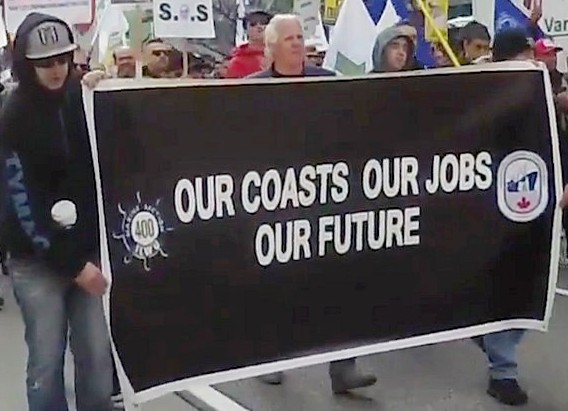 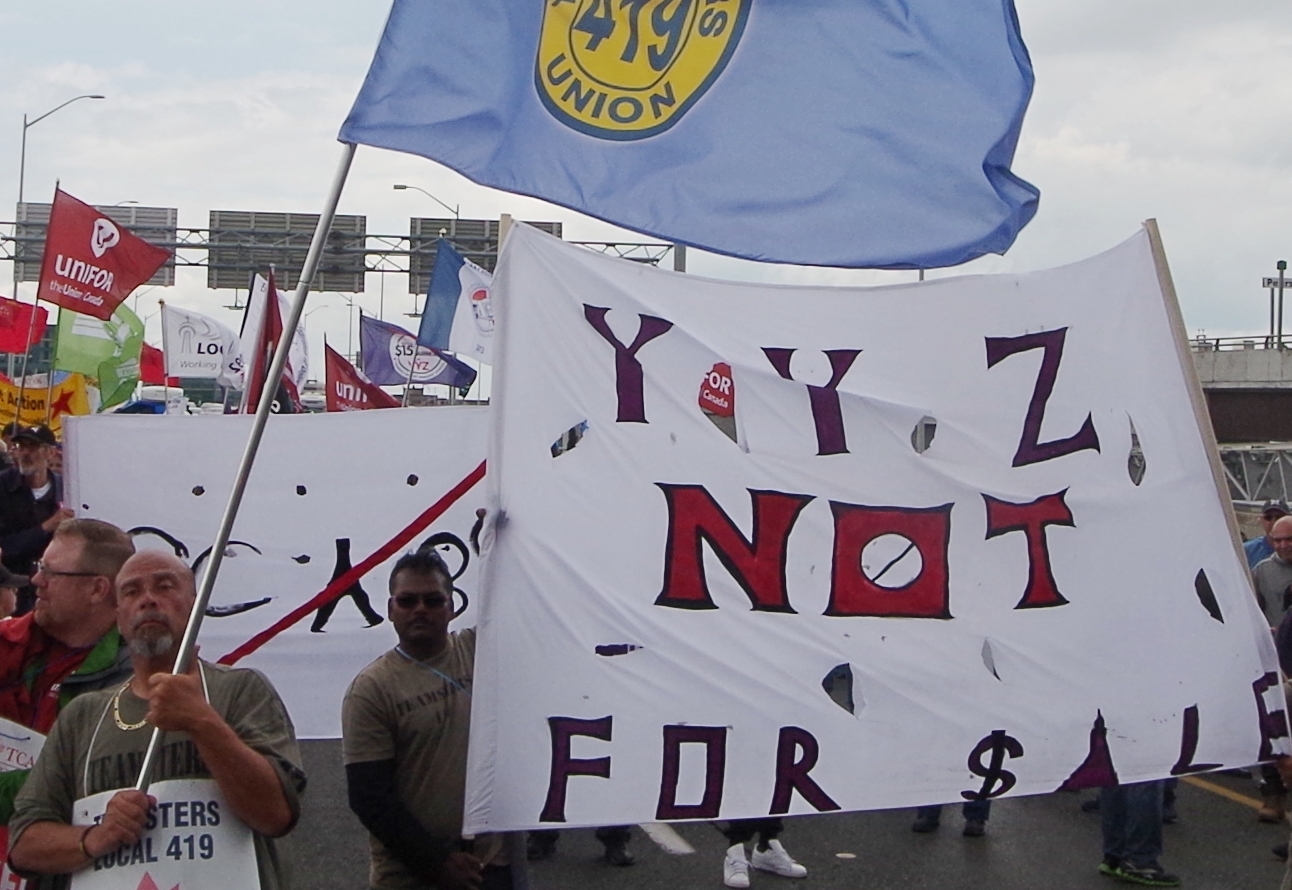
The Standing Committee on Transport, Infrastructure and
Communities has been conducting hearings on Bill C-49, An Act to
amend the Canada Transportation Act and other Acts respecting
transportation and to make related and consequential amendments to
other Acts. The bill passed second reading in June and was referred
to the
Standing Committee for hearings prior to the reconvening of Parliament
on September 18. Hearings were held from September 11-14.
Presentations were made by Transport Minister Marc Garneau, other
Trudeau government officials, representatives of rail, airline and
maritime companies, companies shipping goods (particularly
through railways), unions, state agencies such as the Transportation
Safety Board and various individuals. Presenters also answered
questions from MPs who are members of the Committee.
C-49 is a major bill amending a number of
transportation Acts. Among the main features of the bill are changes to
the international ownership restrictions for Canadian air carriers
allowing increased foreign ownership of Canadian airlines, the
mandatory installation of voice and video recorders in locomotives
under the hoax of improving rail
safety, and the creation of a new mechanism called Long-Haul
Interswitching for shippers who have access to only one railway for
shipping their goods.[1]
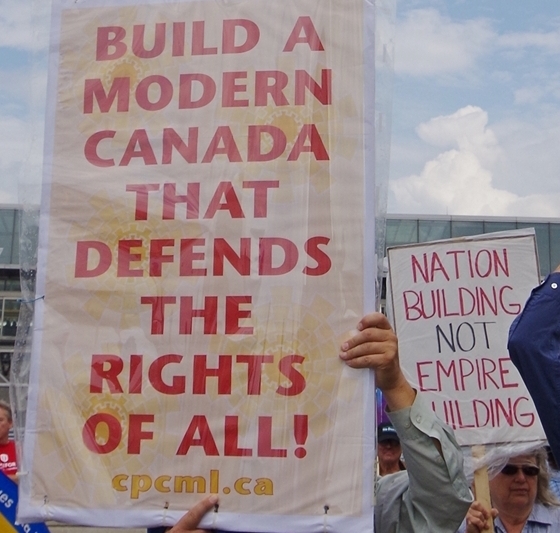
The hearings were organized under the theme of
guaranteeing a "strong transportation system," as fundamental to
Canada's "overall economic performance and competitiveness." This was
also the theme of the Harper government and the Emerson Report it
commissioned in 2014, which was tabled by Minister Garneau in
February 2016.
The thesis of the Emerson Report is that deregulation,
privatization and integration of transportation systems for U.S.-led
empire-building is the only way for Canada to thrive as a country. The
Liberals agree and are adding the fig-leaf of "safeguards,"
"transparency," and "balance" between empire-building and "public
interest" to muddle the
issue and liquidate the workers' fight for their rights and
transportation systems that are part of a pro-social nation-building
project that guarantees the well-being and the rights of all.
On the issue of changes to the foreign ownership
restrictions for Canadian air carriers, Bill C-49 increases the
allowable percentage of foreign ownership from 29 to 49 per
cent. This provision in the bill also states that a single investor can
hold up to 25 per cent of the voting interests of a Canadian
carrier, and an
international carrier can own up to 25 per cent of a Canadian
carrier. The limit of 25 per cent is presented as a safeguard.
This denies the truth that the financial oligarchy is already in
control of what are called Canadian carriers and further that
monopolies can exercise controlling interests with percentages
of 25 per cent and
less. Garneau also promotes increased foreign ownership saying it frees
up "capital investment" for use in the improvement of services. He does
not say what happens to the social wealth that the capital investment
supposedly frees up.
Long-Haul Interswitching
A significant number of presentations at the hearings
were about the new mechanism of Long-Haul Interswitching (LHI).
Minister Garneau presented LHI as a way for shippers in remote regions
to have more choices of carriers to move their goods and therefore
potentially reduce their costs.
Interswitching refers to shippers of products like
lumber, iron ore, grain or consumer goods in Canada's most remote
regions often served by only a single rail line leaving shippers with
few transportation options. With interswitching, the railway company
picks up the cars from a customer and hands them off to another carrier
that performs
the line haul. The line haul includes the majority of the linear
distance of the overall railway movement.
Under the current legislation, interswitching is
available to shippers located 160 km from a recognized interchange
point. Bill C-49 extends this distance up to 1,200 kilometres.
This deregulation measure favours the railway monopolies now operating
mostly in the U.S., as it will increase their access to the Canadian
railway
network.
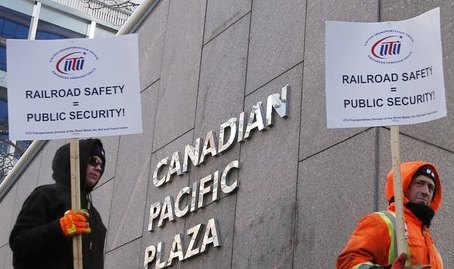 According to many
interveners, LHI was not part of the consultations Minister Garneau
claims were held with stakeholders, and was added to Bill C-49 at the
last minute. It seems that the Trudeau government came up with LHI in
the context of talks with the U.S. on NAFTA renegotiations, to increase
access to the Canadian railway network
to railway monopolies operating in the U.S. According to many
interveners, LHI was not part of the consultations Minister Garneau
claims were held with stakeholders, and was added to Bill C-49 at the
last minute. It seems that the Trudeau government came up with LHI in
the context of talks with the U.S. on NAFTA renegotiations, to increase
access to the Canadian railway network
to railway monopolies operating in the U.S.
CP Rail representatives argued strenuously against LHI
during the hearings and used the opportunity to threaten to abandon
their short lines in remote regions and to leave small shippers without
rail transportation options. They said that the measure would cause
them to lose market share. They would therefore be unable to undertake
the
"capital investment" needed to keep their branch lines in remote
regions alive, as these are costly for CP to maintain and upgrade while
carrying low volumes of goods.
Locomotive Voice and Video Recorders
Many presentations and questions dealt with the section
on locomotive voice and video recorders (LVVRs). The bill makes it
mandatory for rail companies to install LVVRs and allows the rail
companies to have access to the recordings. This was introduced with
full knowledge that railway workers firmly oppose this change as an
attack on
their privacy and dignity.
To enforce the introduction of LVVRs, the bill amends
the Railway Safety Act and the Canadian Transportation
Accident Investigation and Safety Board Act. This measure was not
part of the so-called consultations prior to the tabling of Bill C-49
and comes as a surprise attack. The only mention during talks was a
suggestion that the LVVRs could be part of amendments to the two safety
Acts
to come much later.
At the hearings, the irony could not be missed: the
Transport Minister and his crew claimed that this measure is strictly
designed to improve rail safety and that everything is being done to
protect workers' privacy, while representatives of the Railway
Association of Canada and CP Rail stated vehemently that this measure
is meant to provide
them with video and audio recordings showing inappropriate "behaviour"
which they say is the main cause of rail accidents.
The anti-social thesis the rail monopolies advocate,
with none of the MPs correcting them, is that the railways are safe as
far as equipment and tracks are concerned and what remains to be dealt
with are the "human factors" that are the leading cause of rail
incidents. The representative of the Railway Association of Canada went
so far as to
say that as long as all the processes in the railways are not "fully
automated" there are going to be accidents because of human factors.
According to the rail monopolies, no human factor
exists in equipment and tracks; there is not even a human aim behind
operating the rail companies. The human factor in the operation of the
railways only exists for them in the form of the workers' behaviour,
which must be criminalized. The rail oligarchs advocate both the
elimination of
most of the work force and the criminalization of those who remain.
These measures are already taking place and put communities and the
remaining workers at risk.
 Minister Garneau kept
repeating the fantasy that workers' privacy is going to be protected.
He did not even acknowledge that the bill itself explicitly cancels the
Personal Information Protection and Electronic Documents
Act as far as its application to railway workers is concerned. Minister Garneau kept
repeating the fantasy that workers' privacy is going to be protected.
He did not even acknowledge that the bill itself explicitly cancels the
Personal Information Protection and Electronic Documents
Act as far as its application to railway workers is concerned.
The bill also permits a railway to use the information
collected by recording equipment "to address a prescribed threat to the
safety of railway operations." This is meant to justify taking
exceptional measures against workers based on what is found in the
recordings. No regulation has yet been passed spelling out what
constitutes such a safety
threat. Neither does the bill deal with the very real concerns on the
right of privacy. The bill makes it clear that privacy legislation does
not apply to workers.
Implementation will be done through regulations, said
Garneau, the same way the Harper government carried out Employment
Insurance reform. Garneau himself said that regulations are much more
convenient than a bill because they can be changed without convening
Parliament and are beyond most public scrutiny.
As far as railway workers are concerned, the bill is no
"safeguard" for anything but rather the granting of further police
powers to the rail monopolies to act against the workers with the
government providing a legal framework.
Workers will have none of these attacks of the Liberal
government. They are bravely facing the challenge of stepping up their
fights for their rights and for transportation systems that do not
serve empire-building for the global private interests but rather
pro-social nation-building that favours the people.
Note
1. For more information on the
content of Bill C-49, see TML
Weekly, June 3, 2017.

PREVIOUS
ISSUES | HOME
Website: www.cpcml.ca
Email: office@cpcml.ca
|

